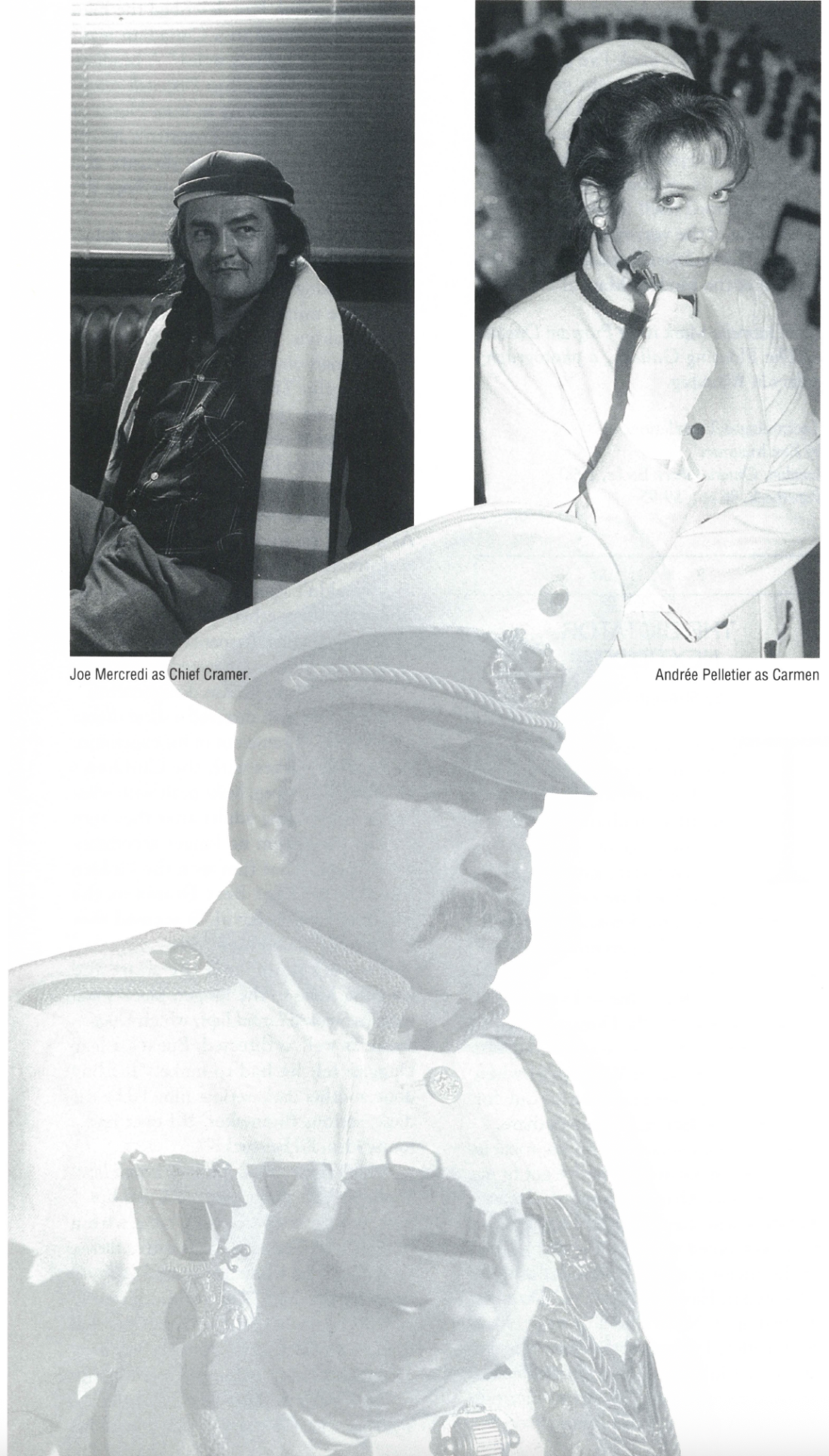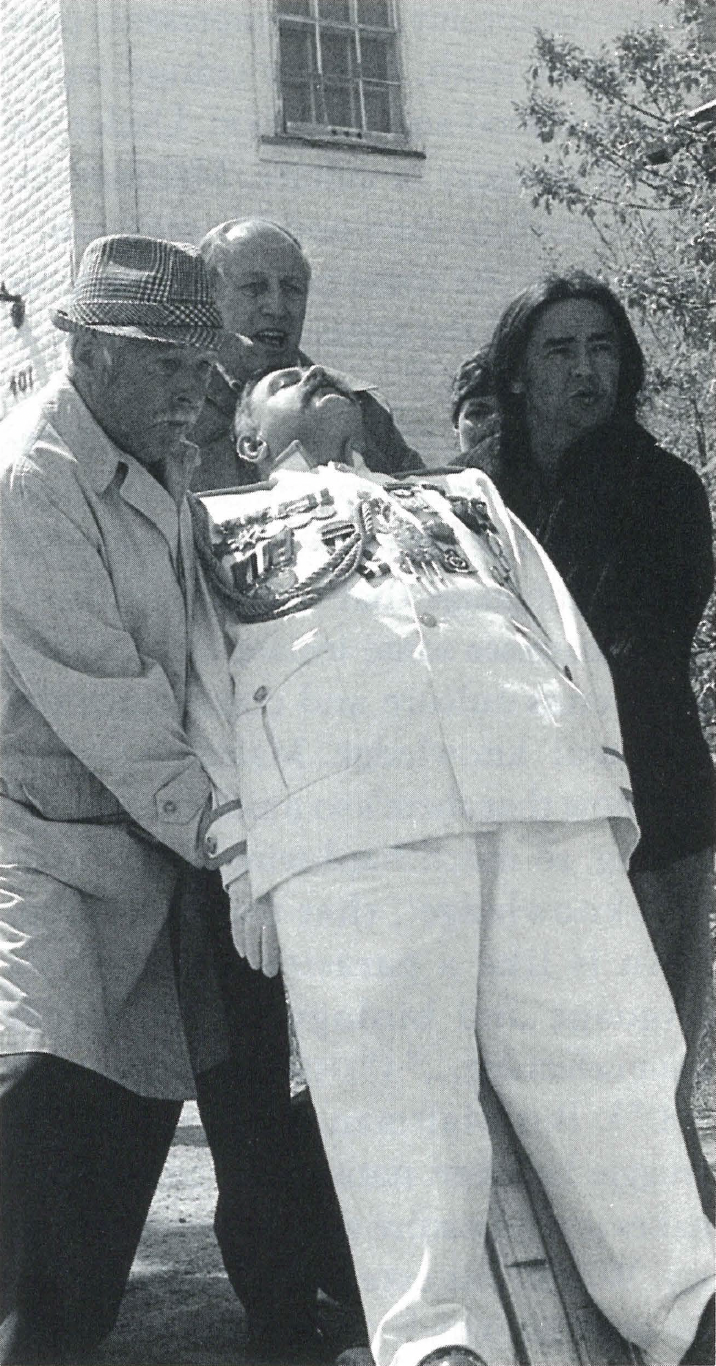The Dictator Next Door
Take a deposed Central American dictator, put him and his millions in blood money in a small Canadian town that’s on the verge of closing down … and stir, gently. M.B. (Bruce) Duggan has done exactly that in his first feature film, Smoked Lizard Lips. The film answers the perennial question: What would YOU do if a Central American Dictator came to live in YOUR town? More specifically, Duggan addresses what happens to the town of Nuscht (somewhere north of Winnipeg) when the bumbling General Sauria, out for blood and revolution, re-situates there.
While it may sound like an improbable plot for a Canadian film, you’ve got to remember two things. First of all, ex-dictators who have no place to go have been welcomed with open arms in some of the nicest places. (Ferdinand Marcos relocated in Hawaii. “Baby Doc” Duvalier washed up in Nice. And a town in Nova Scotia offered to harbour Saddam Hussein after the Gulf War.) Secondly, Smoked Lizard Lips is among the latest offerings from the Winnipeg Film Group.
The New York Post described the Film Group as “warped in a Canadian way” that is “almost politely weird.” A headline in the Columbus, Ohio Dispatch reads, “Strange Films Moving in from North of the Border.” And in Toronto’s NOW Magazine: “Canada’s most distinct and distinctly odd film culture”—perhaps the most accurate assessment of all.
The Winnipeg Film Group has delivered films with unusual subject matter. We’re Talking Vulva allowed viewers to spend five minutes with a walking, rap-singing vulva. The Milkman Cometh is about a man obsessed with a can of condensed milk. The Film Group has also produced Bite, the world’s shortest movie. It clocks in at one second and it was directed by Bruce Duggan.
Duggan took a long route to filmmaking. He’s been a social worker and a poet. As a poet, he wanted to film his public performances around Winnipeg so that they wouldn’t vanish into what he calls “the oral history ether.” It was the process of recording which ensnared him; gradually he became more interested in the films than in the events he was documenting.

In 1989 Duggan directed a short drama called Mike. It came out of his experience as a social worker with the Children’s Home of Winnipeg. Mike dealt with what happens to young adults after they turn 18 and the system no longer accommodates them. That film won the Golden Sheaf Award for Best Drama at the Yorkton Film Festival. It seemed that Duggan had found his métier.
It’s a big jump from the short and sobering Mike to the longer, blackly humorous Smoked Lizard Lips, which Duggan wrote as well as directed. But it’s a leap Duggan felt he had to make. “If I had done another dark, serious film, I’d be the dark, serious filmmaker. If I ever had a funny idea, I’d be stuck!”
What’s funny about Smoked Lizard Lips? Well, for one thing, smoked lizard lips. I dare you to try to say the title with a straight face. The film opens with a fifties-style black and white ad for smoked lizard lips: the product. We watch a mom so perfect she could have been a cut-out doll from an old McCall’s magazine, preparing a nutritious snack of smoked lizard lips for her well-fed, pre-pubescent, baseball cap-wearing son. Courtesy of the gregarious male narrator, we soon learn where the lizard lips come from (the rare Boke Lizard of Canada’s Carberry Desert), and how they’re killed (dubbed on the head to the chants of animal rights activists). The main action of the film is interrupted from time to time to bring us more information about how the product is prepped for transport from the plant to the kitchen table.
In these breaks for the sponsor, Duggan shows that fifties television is one of his influences. He demonstrates his flare for capturing the essence of the post-war domestic world where a Donna Reed surrogate rules the roost, and Dennis-the-Menace kids are out of trouble by supper time.
In the main body of the film, set in the present, Duggan reveals other influences. At the highest level, there’s the Faust myth. Only, this time, it is not one man who loses his soul to the devil, but a whole town. Duggan’s Nuscht is a town, like a lot of real-life places, which has just lost its sole industry; in this case, a nuclear waste dump has been closed by government decree. (Originally Duggan was going to make it a mine closing, but he felt that there wasn’t enough distance from reality. So he settled on a nuclear waste dump. “It seemed like a good thing for people to have,” he says. “There are towns all over the prairies saying, ‘Pick me. Pick me.’ We’ll take the effluvia from your badly planned industrial strategies.”)

Simón Magaña as General Sauria
This is where the overthrown dictator comes in. General Sauria and his entourage are taken from Central America to a deposed dictator holding tank in Washington. Then, through a complicated but hilarious series of negotiations between our (female) Prime Minister and the President of the United States (a greasy-looking man named Kennedy who has to use a walker to get around), Sauria and co. are “removed” to Nuscht. So are his millions.
A Bonanza for Nuscht: the mayor sees a revitalized economy for his dying town where everyone gets a piece of the pie, including Nuscht’s native population.
But of course, there’s a price to pay for the town’s new prosperity. Sauria, hungry for blood, pits the natives against the townspeople. Once a dictator, always a dictator, I guess. And having sold out, everyone goes along with him. Everyone except for Carol, the mayor’s wife, played with real delicacy by Margaret-Anne Macleod.
Bruce Duggan has undertaken a lot in Smoked Lizard Lips. Through this madcap fable he looks at Canada-U.S. relations, free trade, native land issues and the decay of small-town values. It’s an ambitious project and, at times, this ambition undercuts the film. The middle third of Smoked Lizard Lips feels repetitive and somewhat aimless. There’s a saying in the radio business: the listener doesn’t miss what he doesn’t hear. Duggan could have applied the maxim to his advantage. However, the concluding third of the film has enough surprise (and a commercial break for more on smoked lizard lips) that the viewer’s flagging attention is easily revived.
Smoked Lizard Lips is a bold first feature. Duggan has added another dimension to the so-called prairie surrealism of previous Winnipeg Film Group enterprises, like Guy Maddin’s dreamy Archangel or Tales from the Gimli Hospital. Through his heightened reality and homage to old TV, Duggan presents the absurd. I was reminded of the world J.G. Ballard creates in his writing: recognizable, yet just beyond what’s real.
It’s a tightrope act, flirting with the absurd. The danger is that something crazier will come along in real life. But if Bruce Duggan can tease out the absurd as deftly as he does in Smoked Lizard Lips, and I believe he can, it will be a pleasure to be caught laughing at ourselves. He’s just what our aching country needs right now. ♦
Shelagh Rogers is the host of the CBC radio program, “The Arts Tonight.” This is her first contribution to Border Crossings.
Smoked Lizard Lips Directed and written by M.B. Duggan, produced by Greg Klimkiw, Tracy Traeger and M.B. Duggan, 1991, 96 minutes.

